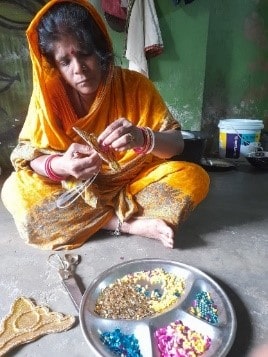
Manashi’s story is not her story alone- it is also the story of scores of other women from her small village. Haripur village in Odisha is a nondescript settlement, predominated by farmers. Most of them are extremely small landholders. Low agriculture base with restrictions on women and their mobility sometimes makes it difficult for definite prototypes of rural women livelihoods to emerge.
Our women’s connect task force in association with Reliance Foundation and the US Agency for International Development (USAID), saw the prospect of the village-women for larger linkages. After intense work on mobilizing on how digital literacy can accelerate growth, our Faculty strategically began work on facilitating technology training of young girls and women from the area to increase women’s economic empowerment through technology from different training centers. “Our only ask from this group in Haripur was to carry their aneroid smart phones to class, which was subjected to use on approval by male-family members” – recalls their faculty. Could prospects of economic empowerment outweigh old social taboos in an area with extremely skewed gender norms?
After weeks of mentoring, and dialoguing on the utility of digital literacy in this village, Manashi came forward with an intense dream, “I am class 10 pass and no-one considered my role outside kitchen in my 41 years of life but now I think I will put my foot down.” Manasi’s digital skill training led her to create handicraft items which she learned from YouTube Tutorials. “We have one smart phone at home and that was my only tool to learn.” Manashi gathered other women from her colony to create more antique jewelry and products, skilfully following the online resources they discovered during the training. With the help of her faculty, she uploaded few product-images on an ecommerce site, which provided an interface to small artisans across India to sell handicrafts, tribal artifacts and ethnic products. Next, under the guidance of her trainers, she linked her bank account with online payment mediums. “The first time is always the special,” marks Manashi making a profit of INR 700. “We used this amount to buy raw materials and make more items from the online orders we received”, she assured.
skill training led her to create handicraft items which she learned from YouTube Tutorials. “We have one smart phone at home and that was my only tool to learn.” Manashi gathered other women from her colony to create more antique jewelry and products, skilfully following the online resources they discovered during the training. With the help of her faculty, she uploaded few product-images on an ecommerce site, which provided an interface to small artisans across India to sell handicrafts, tribal artifacts and ethnic products. Next, under the guidance of her trainers, she linked her bank account with online payment mediums. “The first time is always the special,” marks Manashi making a profit of INR 700. “We used this amount to buy raw materials and make more items from the online orders we received”, she assured.
The news of her online business flew like a breeze. Soon there was a crowd of women from neighboring villages eager to trade through digital. “There are micro-artisans in remote villages with pin codes that do not even exist on the radars of courier companies,” Manashi regrets. On her newly created social media account, “the ON-SALE post of our hand-made vintages went viral.” Manashi adopted hyper digitization of her-product marketing with aplomb. “My children are smarter in maneuvering smart phones but today they claim I can do better than them with my professional training and an income” notes the mother.